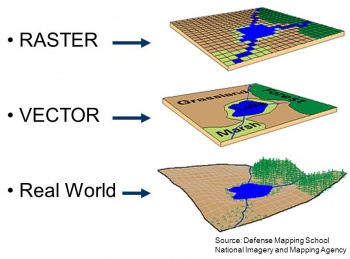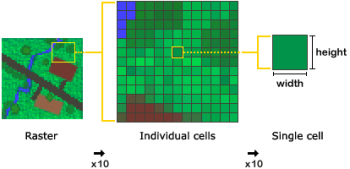Difference between revisions of "Types of Data"
From IMSMA Wiki
| Line 20: | Line 20: | ||
<br/> | <br/> | ||
<br/> | <br/> | ||
| + | '''For more information:''' | ||
[http://gisgeography.com/spatial-data-types-vector-raster/ GIS Spatial Data Types: Vector vs Raster] | [http://gisgeography.com/spatial-data-types-vector-raster/ GIS Spatial Data Types: Vector vs Raster] | ||
{{NavBox Remote Sensing and Spatial Analysis}} | {{NavBox Remote Sensing and Spatial Analysis}} | ||
[[Category:PEW]] | [[Category:PEW]] | ||
Latest revision as of 15:10, 10 August 2016
Raster vs. Vector Data
Vector Data
Vector data comprises of vertices and paths. These include points (hospitals), lines (roads) and polygons (areas). Vector data can be in various data formats, these include:
- KML, KMZ (often used in Google Earth or other web GIS programs)
- Shape File (.shp) this is the standard file format for vector data and will contain only a single dataset
- Geodatabase (.gdb) these will contain multiple datasets simultaneously.
Raster Data
Raster data is made up of pixels (also referred to as grid cells). Raster’s often look pixelated because each pixel is associated with a value or a class. Rasters include satellite and UAV/UAS imagery, elevation data models, etc. Common raster file formats are:
- .jpeg, .png, .tiff, .bmp
For more information:
GIS Spatial Data Types: Vector vs Raster
| |||||||||||


